Sapa Inca
The Sapa Inca (in hispanicized spelling) or Sapa Inka (Quechua for "the only Inca"), also known as Apu ("divinity"), Inka Qhapaq ("mighty Inca"), or simply Sapa ("the only one") was the ruler of the Kingdom of Cusco and later, the Emperor of the Inca Empire (Tawantinsuyu) and the Neo-Inca State. The origins of the position are mythical and tied to the legendary foundation of the city of Cusco but historically it seems to have come into being around 1100. The position was hereditary, with son succeeding father.
There were two known dynasties, led by the Hurin and Hanan moieties respectively.[1] The latter was in power at the time of Spanish conquest. The last Sapa Inca of the Inca Empire was Atahualpa, who was executed by Francisco Pizarro and his conquistadors in 1533, though several successors later claimed the title.
Pre-Conquest Sapa Incas
First dynasty
Little is known of the rulers of the first dynasty of Sapa Incas. Evidently, they were affiliated with the Hurin moiety and their rule did not extend beyond the Kingdom of Cusco. Their origins are tied to the mythical establishment of Cusco and are shrouded in later foundation myth. The dynasty was supposedly founded by Manco Cápac, considered the son of the sun god Inti.
| Sapa Inca | Picture | Birth | Death |
|---|---|---|---|
| Manco Cápac c. 1200 CE – c. 1230 |  | Considered the son of the sun god Inti | c. 1230 |
| Sinchi Roca c. 1230 – c. 1260 | 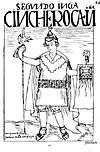 | son of Manco Cápac | c. 1260 |
| Lloque Yupanqui c. 1260 – c. 1290 |  | son of Sinchi Roca | c. 1290 |
| Mayta Cápac c. 1290 – c. 1320 |  | son of Lloque Yupanqui | c. 1320 |
| Cápac Yupanqui c. 1320 – c. 1350 | 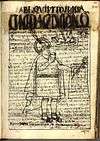 | son of Mayta Cápac | c. 1350 |
As a rough guide to the later reputation of the early Sapa Incas, in later years capac meant warlord and sinchi meant leader.
Second dynasty
The second dynasty was affiliated with the Hanan moiety and was founded under Inca Roca, the son of the last Hurin Sapa Inca, Cápac Yupanqui. After Cápac Yupanqui's death, another of his sons, Inca Roca's half-brother Quispe Yupanqui, was intended to succeed him. However, the Hanan revolted and installed Inca Roca instead.
| Sapa Inca | Picture | Birth | Death |
|---|---|---|---|
| Inca Roca c. 1350 – c. 1380 |  | son of Cápac Yupanqui | c. 1380 |
| Yáhuar Huácac c. 1380 – c. 1410 |  | son of Inca Roca | c. 1410 |
| Viracocha c. 1410–1438 |  | son of Yáhuar Huácac | 1438 |
| Pachacuti 1438–1471 |  | son of Viracocha | 1471 |
| Túpac Inca Yupanqui 1471–1493 |  | son of Pachacuti | 1493 |
| Huayna Capac 1493–1527 |  | son of Túpac Inca Yupanqui | 1527 |
| Huáscar 1527–1532 | 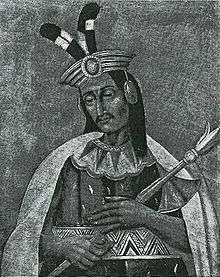 | son of Huayna Capac | 1533 Killed by Atahualpa |
| Atahualpa 1532–1533 | 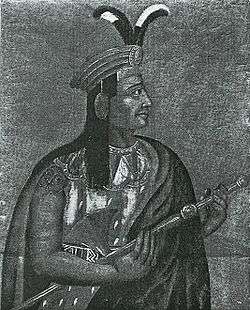 | son of Huayna Capac | 26 July 1533 Killed by the Spaniards |
Ninan Cuyochi, who was Inca for only a few days in 1527, is sometimes left off the list of Sapa Incas because news of his death from smallpox arrived in Cusco shortly after he was declared Sapa Inca. He had been with Huayna Cápac when he died of smallpox. The death of Ninan, the presumed heir, led to the Inca Civil War between Huáscar and Atahualpa, a weakness that the Spanish exploited when they conquered the Inca Empire.
Post-Conquest Sapa Incas
| Sapa Inca | Picture | Birth | Death | Notes |
|---|---|---|---|---|
| Túpac Huallpa 1533 | son of Huayna Capac | 1533 | Installed by Francisco Pizarro. | |
| Manco Inca Yupanqui 1533–1544 | 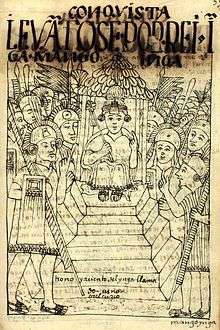 | son of Huayna Capac | 1544 | Installed by Francisco Pizarro. Led a revolt against the Spaniards in 1536; after his defeat, established the Neo-Inca State in Vilcabamba. |
| Paullu Inca 1536–1549 | 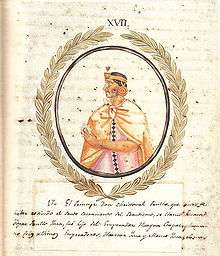 | son of Huayna Capac | 1549 | Installed by the Spaniards after Manco Inca rebelled; ruled in Cuzco. |
| Sayri Túpac 1544–1560 |  | son of Manco Inca Yupanqui | 1560 | Ruled in Vilcabamba. |
| Titu Cusi 1563–1571 |  | son of Manco Inca Yupanqui | 1571 | Ruled in Vilcabamba. |
| Túpac Amaru 1571–1572 | | son of Manco Inca Yupanqui | 24 September 1572 Killed by the Spaniards | Ruled in Vilcabamba. The last Sapa Inca. |
This last Sapa Inca must not be confused with Túpac Amaru II, leader of an 18th-century Peruvian uprising.
In popular culture
Literature
- Pachacutec , a resurrected Sapa Inca king who is over 500 years old, plays a major role in James Rollins' novel Excavation.
See also
| Wikimedia Commons has media related to Inca emperors. |
References
- ↑ Pedro Sarmiento de Gamboa; Gabriel de Oviedo (1907). History of the Incas. Hakluyt Society. p. 72.